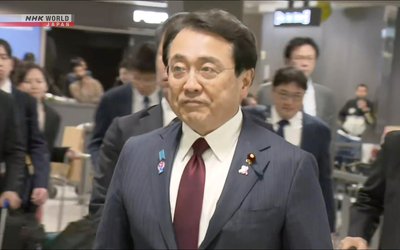More on Politics





Prime Minister Baburam Bhattarai-led government issued a direction to the heads of diplomatic mission based in the capital not to call on president Dr. Ram Baran Yadav. The government argued that diplomats cannot meet the president without its approval.
Prime Minister Bhattarai has already forwarded nine ordinances, including those on the amendment of the article of the Interim Constitution, and the Commissions on Disappearance, and Truth and Reconciliation. Similarly, the government has been defying the court order by giving pardon to its party workers convicted by the court in various criminal cases.
Four months after the natural death of the Constituent Assembly, in the midst of the growing uncertainty over the forthcoming elections, some of the decisions taken by the care taker government have sparked new rounds of controversy.
According to constitutional lawyers, Nepal has experimented with all different kinds of government in the last six decades of its democratic pursuit. But this is the first government in the history which is exercising sweeping powers without any accountability to anywhere and violating the constitutional order one after another.
The modern governments are accountable to various state organs, including president, elected legislature, judiciary, and political parties and legitimatized by international recognitions and civil society.
However, this government is now defying all these forces. In his statement to the Press Council, the prime minister even urged the media to use 'respected words.' The prime minister also asked the rights groups, who are opposing the Disappearance and Truth and Reconciliation bills, to be mindful.
"Nepal has been under a unique situation with the government becoming accountable to nowhere. However, it is locking horns with every organization within the country and outside. The government has already demonstrated that it is not accountable to the President, Court, Opposition, Civil Society, and International forces," said a senior advocate and former attorney general on condition not to be named. "By defying the order of the court, the government seeks pardon for its members who were convicted under the existing laws. It is defying the opposition forces because they are not in a position to replace him through an elected body. As it denies the right of the people to vote by postponing the election date for an indefinite period, it is not accountable to the people either. As the government is instructing diplomats not to call on the head of state of Nepal, it shows that it is not accountable to international community,” said a senior advocate and former attorney general on condition of anonymity. “Looking at its actions, one can draw the conclusion that this is the worst kind of dictatorial government in the present day Nepal."
However, others disagree. "Till the elections of the new Constituent Assembly to produce the new government, this is the only legitimate government and it can exercise full executive power to issue pardon, ordinance and directions to heads of foreign mission in Nepal," said advocate Khim Lal Devkota, who is close to UCPN-Maoist.
As there is no elected body, the government has already recommended a number of ordinances before the president. Opposition parties see this move as directed to rule the country under a decree.
"According to its performance, this is the most dictatorial government. The president should not endorse ordinances presented by the government," said Prem Bahadur Khadka, president of Nepal Bar Association. Only a full fledged government can issue ordinances, not a caretaker government."
Other lawyers hold different views. "The opposition call to the president to reject the ordinances recommended by the cabinet is a political move. As per the constitution, the executive power lies with the cabinet. But because the cabinet is presently a caretaker one, it has to recommend only those ordinances which are absolutely necessary for taking care of the country and its governance. If the ordinance is necessary for that purpose, then the president has no authority to say no. In short, the president should not take any steps which would create problems for the present government to take care of the country," said constitutional lawyer Purna Man Shakya in his Interview to The Kathmandu Post.
Who can issue ordinance?
Some lawyers argue that only a few governments, especially those constitutionally competent, can issue ordinances. That can be a full-fledged government having a parliament but when the existing parliament is not in session. Or, a government voted out in the parliament, waiting for the next government to be formed by the parliament.
However, the constitutional status of the present government is different. With no parliament or Constituent Assembly to form the next government and no legislature for the immediate future, everything including the date of elections and institutions to hold the elections are at stake. More importantly, there is no possibility of forming the next government. This government cannot issue ordinance because this is not a constitutionally competent government
Given the present political state, it seems unlikely that the present set of government will change in the near future and the debate on the supremacy of law and constitution is just for public consumption.





